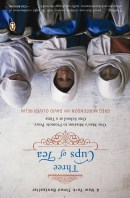Greg Mortenson and his book, Three Cups of Tea, may literally be, alas, a parable, or perhaps a fable, for the modern age. Now that 60 Minutes has asserted that his accounts of his days in deepest Pakistan were fabricated or exaggerated, there are the denials from the author and the bitter aftertaste of another idol smashed.
Of course, Morteson wasn’t an idol, but he did become something more important: an example. The notion that he presented — that you need to get to know people before you can hope to change their lives — is the counter-insurgency corollary of the Golden Rule. In some quarters, this “insight” was treated much as the Munchkins viewed the Wizard of Oz — with profound amazement.
Three Cups of Tea became shorthand for what the U.S. and its allies are trying to do in Afghanistan. “A lot of people cite, you know, the book Three Cups of Tea as an example of Afghan culture and society,” Army Col. William Burleson, a brigade commander, noted last November from Afghanistan. “And, truthfully, after having read it several times, I believe it. It is about establishment of relationships.”
It even works in Haiti, according to Navy Capt. Bruce Lindsey, who was aiding earthquake victims there a year ago. “I think it was — is it Three Cups of Tea? — is a great book that shows the same type of dynamic, that you have to work with the people,” he said. “They know what they need.”
Adm. Mike Mullen, chairman of the Joint Chiefs of Staff, has cited Mortenson repeatedly. “No e-mail, no phone call, no PowerPoint slide, no VTC can adequately substitute for face-to-face conversations, shaking hands and what my friend Greg Mortenson calls drinking tea,” Mullen told a college commencement last year. “Greg’s mission began as a repayment to the villagers who saved his life after a failed attempt to summit K2. The village chief who later became a surrogate father to Greg told him, we drink three cups of tea to do business. The first, you are a stranger; the second, you become a friend; the third, you join our family. And for family, we are prepared to do anything — even die.”
A veteran Pakistani hand, now back in the U.S. — and speaking privately — says Mortenson caught on because he captured a kinder, gentler way for Americans to see the troubled region. “Folks are so starved for a way to look at AfPak that doesn’t involve violence, and that makes them feel useful, and like they can make a difference,” she surmises. “He provided a more optimistic way of looking at the region and people want to believe it. I really wonder, though, why journalists never questioned his story before this.”
The bottom line: no one needs a book, or its author, to tell you how to get along with people. And if the war in Afghanistan is worth the 1,534 lives, and nearly a half-trillion dollars, we’ve pumped into it, it’s worth it whether or not Three Cups of Tea is fact or fiction, or — most likely — some blend of both.



